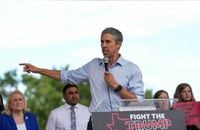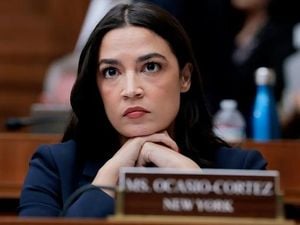On a sweltering August weekend in Austin, Texas, two political heavyweights squared off in a high-stakes battle that could reshape the state’s political future. Attorney General Ken Paxton, wielding the power of the courts, announced on Saturday, August 16, 2025, that he had secured a court order to halt former Congressman Beto O’Rourke from financially aiding Texas Democrats who had fled the state. Their exodus was a dramatic move to block a vote on a controversial congressional redistricting map, a proposal closely associated with former President Donald Trump and set to redraw the state’s political lines for years to come.
But as Paxton declared victory in the legal arena, O’Rourke was rallying a crowd of thousands in Austin, promising his supporters that the fight was far from over. “Thanks to everyone who has joined this fight we were able to make a more than $1 million donation to the House Democratic Caucus, the Black Caucus, the Mexican American caucus and we are going to continue to fight, to raise, to organize, to register, to mobilize,” O’Rourke announced, his voice echoing across the energized crowd. According to The Texas Tribune, these funds had come from more than 55,000 individual donations from supporters all across the nation, funneled through O’Rourke’s Powered by People political action committee.
At the heart of this political standoff is the Republican-led effort to redraw Texas’s congressional map in the middle of the decade—a move that could net the GOP up to five additional seats in the 2026 midterm elections. Over 50 Democratic members of the Texas House had fled to Illinois and other states in early August, breaking quorum and effectively stopping the legislative process in its tracks. Their aim: to prevent what they described as a partisan power grab and to buy time for legal and political maneuvering.
The Republican response was swift and forceful. Civil arrest warrants were issued for the absent Democrats, and state officials even sought to extradite them from Illinois. Governor Greg Abbott’s first special session ended on Friday, August 15, 2025, without any action on redistricting, as Democrats maintained their absence for a full two weeks. Undeterred, Governor Abbott immediately called a second special session to begin on August 18, signaling that the battle was far from over.
Meanwhile, the question of money loomed large. Attorney General Paxton’s court order specifically barred O’Rourke and Powered by People from sending donations directly to the individual Democratic lawmakers who had left the state, or from covering any fines those lawmakers might incur for their absence. Paxton declared to the press, “In Texas, lawless actions have consequences, and Beto’s finding that out the hard way.”
But O’Rourke and his team found a workaround. Rather than sending funds to individual legislators, Powered by People directed the more than $1 million in donations to the Texas House Democratic Caucus, the Texas Legislative Black Caucus, and the Mexican American Legislative Caucus. These organizations could then use the funds as they saw fit, supporting both those who had left the state and those who remained. In a court filing, David Mills Wysong of Powered by People stated, “Powered by People did not make any offers to fundraise or help pay for legislative fines, hotel, and travel expenses in exchange for any political action or restraint.”
Still, the legal fight escalated. Tarrant County District Judge Megan Fahey issued a temporary injunction, siding with Paxton and barring Powered by People from fundraising or financially supporting the quorum break. Paxton accused O’Rourke of violating this order, asking the court to fine him $500 for each alleged violation and to jail him for the duration of the case. O’Rourke, in turn, countersued, claiming that Paxton’s probe was a “fishing expedition” that infringed on constitutional rights.
As legal filings and political rhetoric flew, the Democrats’ walkout was already being hailed as a political success by some party leaders. Rep. Gene Wu, chair of the House Democratic Caucus, told The Texas Tribune that the effort “reshaped the entire 2026 landscape” by rallying national support and buying time to prepare a legal strategy against what he called a “racist map.” For Democrats, the flood of donations and the surge of national attention were seen as crucial victories, even if the immediate legislative battle seemed lost.
On the other side, Republican leaders made it clear that patience had run out. Speaker Dustin Burrows, R-Lubbock, declared on Monday, August 18, “we are done waiting. We have a quorum. Now is the time for action.” With Democrats no longer able to block the vote by their absence, the GOP was poised to move forward with the redistricting plan, setting the stage for a fierce fight in the courts and at the ballot box.
The legal wrangling over O’Rourke’s donations continues, with Paxton’s case still active as of August 19, 2025. The broader political implications, however, extend far beyond the courtroom. The standoff has galvanized both sides, with Republicans determined to push through their agenda and Democrats vowing to keep up the fight through fundraising, organizing, and legal challenges.
For many Texans, the spectacle has been both exhausting and exhilarating—a vivid illustration of the high stakes and deep divisions that define the state’s politics. The use of out-of-state donations, the deployment of civil arrest warrants, and the invocation of constitutional rights all point to a battle that is as much about principle as it is about power.
As the second special session gets underway, all eyes are on Austin. Will the Republicans’ redistricting plan survive the legal and political onslaught? Can Democrats convert their national support into lasting change? Or will the courts ultimately decide the fate of Texas’s congressional map?
One thing is clear: the events of August 2025 have set the stage for a dramatic showdown in 2026, with the balance of power in Texas—and perhaps in Congress itself—hanging in the balance. The fight over redistricting, donations, and democracy is far from over, and both sides are digging in for the long haul.
With the legal battles intensifying and political passions running high, Texans—and indeed the nation—are watching closely to see what comes next. The outcome will reverberate far beyond the Lone Star State, shaping the contours of American politics for years to come.




